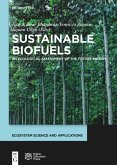With the dwindling supplies of fossil fuels and growing concerns regarding climate changes due to green house gasses from these fuels, public opinion has swung dramatically towards favoring the development of renewable energy sources. In Biofuels: Methods and Protocols, career-long experts explore a full range of methods for bioenergy covering important topics such as biomass production and delivery to the biorefinery, detailed biochemical characterization, as well as biotechnological techniques for converting plant matter into fuels and chemicals. Time is of the essence in this field, and this volume aims to provide direction and assistance to the growing cadre of researchers endeavoring to develop new sources of bioenergy with a solid, easy-to-use collection of tried-and-true methods which will save time and effort in the field and the laboratory. Written in the highly successful Methods in Molecular Biology(TM) series format, chapters include brief introductions to their respective topics, lists of the necessary equipment, materials and reagents, step-by-step, readily reproducible field and laboratory protocols, and notes on troubleshooting and avoiding common pitfalls.
Timely and authoritative, Biofuels: Methods and Protocols seeks to help scientists and engineers as they develop and optimize bioenergy technologies needed to drastically change the course of our energy future as soon as possible.
This editor believes the public finally understands that bioenergy should be a critical new 39 component of our world's future energy supply. While this new enlightenment might have 40 come from bioenergy's environmentally friendly attributes and its renewable and sustain- 41 able nature, the reality is that the primary driver has been both the high cost of energy, 42 led recently by petroleum products, and the unique climatic changes such as local weather 43 events and reports of melting of ancient glaciers. I believe that much of the public under- 44 stands the primary cause of these changes is the growing demand for fossil fuels for heat- 45 ing and transportation needs driven by both population increases and dramatic economic 46 development around the globe. This increased demand, as well as global politics, has 47 impacted the costs for these energy products. At the same time, increased use of fossil fuels 48 has been liberating unprecedented levels of CO and other greenhouse gasses (GHGs) 49 2 that must be impacting the global climate. As a result, the world is looking for alternative 50 solutions. Renewable energy is one of the leading options as long as it is pursued in a sus- 51 tainable fashion. Of course, renewable energy has numerous sources, including wind, solar, 52 geothermal, ocean currents/tides, and bio-based energy. The latter category of renewable 53 energy is centered primarily on use of green plant matter, i. e.
Timely and authoritative, Biofuels: Methods and Protocols seeks to help scientists and engineers as they develop and optimize bioenergy technologies needed to drastically change the course of our energy future as soon as possible.
This editor believes the public finally understands that bioenergy should be a critical new 39 component of our world's future energy supply. While this new enlightenment might have 40 come from bioenergy's environmentally friendly attributes and its renewable and sustain- 41 able nature, the reality is that the primary driver has been both the high cost of energy, 42 led recently by petroleum products, and the unique climatic changes such as local weather 43 events and reports of melting of ancient glaciers. I believe that much of the public under- 44 stands the primary cause of these changes is the growing demand for fossil fuels for heat- 45 ing and transportation needs driven by both population increases and dramatic economic 46 development around the globe. This increased demand, as well as global politics, has 47 impacted the costs for these energy products. At the same time, increased use of fossil fuels 48 has been liberating unprecedented levels of CO and other greenhouse gasses (GHGs) 49 2 that must be impacting the global climate. As a result, the world is looking for alternative 50 solutions. Renewable energy is one of the leading options as long as it is pursued in a sus- 51 tainable fashion. Of course, renewable energy has numerous sources, including wind, solar, 52 geothermal, ocean currents/tides, and bio-based energy. The latter category of renewable 53 energy is centered primarily on use of green plant matter, i. e.
From the reviews: "Bioenergy research, development and industrialization are moving at a rapid pace. ... This book is therefore timely and focuses on lignocellulose-to-bioethanol technologies, with particular emphasis on maize residues and 'energy crops' ... . Biomass supply, pretreatment and analysis are well covered ... . This is a most useful text, or ... lab handbook, that covers many analytical methods and applications for biomass-to-biofuel technologies." (Graeme Walker, Microbiology Today, June, 2010)








